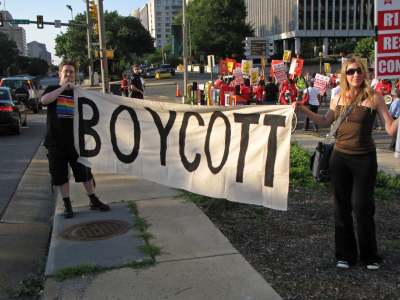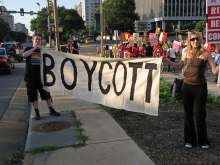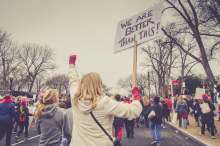Recent examples of successful boycott campaigns
The boycotts listed below are presented in reverse chronological order, with the most recent first.
Sabra boycott success – November 2024
In the US, the brand Sabra hummus was owned 50/50 by PepsiCo and The Strauss Group. The Strauss Group is Israel's second biggest food company and according to the Palestinian Boycott, Divestment and Sanction (BDS) movement it "provides financial support to the Israeli Defense Forces. Palestinian rights campaigners called for a boycott of Sabra since at least 2011. In November 2024 following an intensified period of campaigning against the brand, it was announced that The Strauss Group was selling its stake in Sabra, leaving PepsiCo as the sole owner of the Sabra hummus brand.
This appears to be a significant milestone/ partial boycott campaign success. However, PepsiCo also owns Sodastream which is subject to a BDS boycott too. It's worth noting that in the UK Sabra was not owned by Sabra/PepsiCo, but instead by Osem Ltd, an Israeli company which is ultimately owned by Nestle. As Nestle faces several boycott calls, Sabra hummus still features on our list of active boycotts.
AXA boycott success – August 2024
The Stop AXA Assistance to Israeli Apartheid coalition called for a boycott of AXA over its investments in Israeli banks and Elbit Systems (Israel's largest weapons manufacturer) since at least 2019. According to the BDS movement, over 10,000 people and 230 organisations have signed the pledge to boycott AXA. Among the campaign's activities include holding an AXA Global Day of Action on 25 April 2022, seeing supporters globally contacting AXA Customer Services to demand the company end its complicity in Israeli apartheid.
On 21 August 2024 the Stop AXA Assistance to Israeli Apartheid coalition shared the news that AXA had sold its investments in all major Israeli banks and Elbit Systems, Israel’s largest military company. While a major milestone for the campaign, it continues to call for a boycott of the company until it fully divests from other complicit companies, and as such AXA still features on our list of active boycotts.
Barclays boycott success – June 2024
Barclays invests over £1bn in arms companies supplying Israel with weapons and military technology. The company’s sponsorship of major music festivals including Download, Latitude, and Isle of Wight was cancelled in June after protests by artists and fans. A spokesperson for Barclays told the Guardian, “Barclays was asked and has agreed to suspend participation in the remaining Live Nation festivals in 2024.
Pret boycott success – May 2024
According to the UK activist organisation Palestine Solidarity Campaign (PSC), in 2022, coffee chain Pret signed a franchise agreement with Israel-based companies and committed to opening 40 stores in Israel over the next decade. In 2024 PSC threatened a boycott of Pret, arguing that “to invest in Israel as it conducts a genocide in Gaza and operates a system of apartheid over all Palestinians was unjustifiable and reprehensible.”
In June 2024 the Grocer reported that Pret has gone back on this agreement, worth millions of pounds, and would not open stores in Israel. Pret cited as the cause for its cancellation of the contract “ongoing travel restrictions” preventing it from conducting the checks and training needed to set Pret up in a new market.
Baillie Gifford boycott success – May 2024
Scotland-based investment firm Baillie Gifford was dropped as a sponsor by multiple arts and literary events in May over concerns that its activities are linked to Palestinian human rights abuses. In 2023 the firm was listed as one of the top 50 European investors in illegal Israeli settlements. Baillie Gifford has investments in companies linked to the Israeli state and illegal settlements, including a travel company, construction company, and US tech company that has Israeli subsidiaries.
Over 700 authors, from Naomi Klein to Sally Rooney, signed a statement by Fossil Free Books (FFB) demanding that Baillie Gifford cease its investments in fossil fuels and companies that profit from "Israeli apartheid, occupation and genocide" and calling for a boycott of the company until that happened. The company’s sponsorship of several literary festivals including the Hay Festival, Edinburgh International Book Festival, and book festivals in Borders, Wimbledon, Cheltenham, Cambridge, Stratford, Wigtown, and Henley festivals were cancelled.
Russia boycott success – April 2024
The Russia boycott gained faster brand buy-in than perhaps any boycott campaign in history. To date, over 1,000 brands have curtailed operations in Russia, from Airbnb to Blackrock and Sainsbury’s.
Following the Russian invasion of Ukraine, on March 7th 2022 Ukrainian President Volodymyr Zelensky called for an international “boycott of Russian exports, in particular the rejection of oil and oil products from Russia.” Subsequently, Ukraine’s Culture Minister called for a boycott of Russia in December 2022. The Yale School of Management continues to track companies that are still operating in Russia.
Twitter/X boycott success – January 2024
Twitter/X has lost half its advertising revenue since Musk’s takeover in 2022, with over 500 advertisers stopping spending on the platform. In 2022, the coalition 'Stop Toxic Twitter', composed of around 60 organisations, wrote an open letter asking Twitter’s top 20 advertisers to "cease all advertising on Twitter globally" while the platform failed to take the increase in harmful and inaccurate content seriously, for example by moderating more thoroughly to reduce the amount of these posts on the site.
Read more about other boycott calls of X/Twitter and Tesla.






